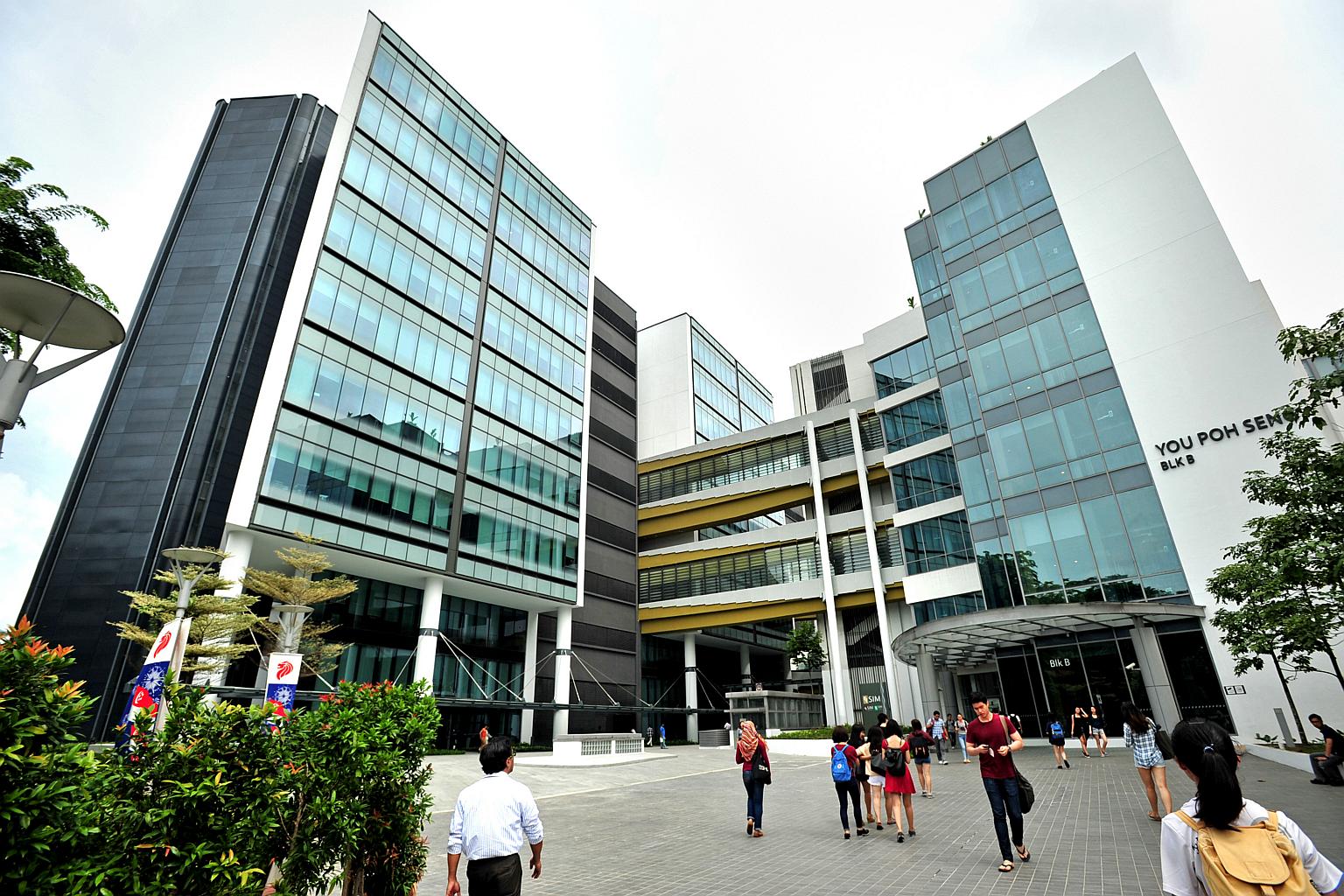Move to gauge worth of private degrees
Graduates from 9 private schools being surveyed on jobs and wages
Sign up now: Get ST's newsletters delivered to your inbox

You Poh Seng Building (right) at the Singapore Institute of Management (SIM) campus.
PHOTO: ST FILE
Pearl Lee
Follow topic:
Students who graduated from nine private schools in 2014 are being surveyed to find out what jobs they went into and what their wages are.
The Council for Private Education (CPE), which regulates the private education sector, is leading the initiative, supported by the Ministry of Manpower and Ministry of Education (MOE).
The CPE told The Straits Times that the information collected will "help to guide future policy formulation for matters related to private education, manpower and graduate employment outcomes".
The nine schools are: Curtin Education Centre; ITC School of Laws; James Cook Australia Institute of Higher Learning; Kaplan Higher Education Institute; Management Development Institute of Singapore; Ngee Ann-Adelaide Education Centre; Singapore Institute of Management; SMF Institute of Higher Learning and Trent Global College of Technology and Management.
These schools were chosen as they had the largest student enrolment, the CPE said.
The MOE's higher education policy division awarded a tender worth $109,000 to research firm Forbes Research in October last year, to carry out an 18-week-long study on the 13,000 students who graduated from these schools in 2014.
A sample of the survey questionnaire was appended to the tender documents. It asked respondents for their employment status in the year before they started their private studies and six months after completing their last exams at the private school.
They were also asked for their basic and gross monthly salaries before and after getting their degrees.
One question asked the graduates if they wished they had not furthered their studies at a private institute. If they answered yes, they would be asked to select the reason from a list of options, such as their qualification being not as well recognised by employers when compared to those of public institutions, or that the career prospects and wages associated with the degree were below expectations.
There are more than 300 private schools in Singapore, with many offering diploma and degree programmes. These are attended by an estimated 77,000 Singaporeans and 29,000 foreigners. Students who do not make the cut at public universities often take a degree at these private institutes.
As part of the national SkillsFuture movement, the Government has been encouraging people not to focus on chasing a degree, but on acquiring specialised skills.
The polytechnics and autonomous universities are mandated by MOE to conduct a graduate employment survey each year.
Among those being surveyed is Mr Daniel Ng, 30, who got his first degree in logistics management from Kaplan here in 2014.
The former logistics specialist will soon take on a managerial role in another supply chain firm. The job, which requires candidates to possess at least a degree, comes with a salary increase of about 50 per cent.
The former Temasek Polytechnic student ,who started working seven years ago, said getting a degree has created "more opportunities".
He paid about $20,000 in all for his part-time degree and completed it in 18 months. "Having a degree makes a difference, especially when you are working in a multinational company. Degree holders start at a higher pay grade."
But Mr Ng knows he is luckier than his peers. "I have friends who also went for a degree, but it made no difference to their work. It's quite common and is partly why I didn't pursue a degree earlier."
Human resource expert David Leong, who runs PeopleWorldwide Consulting, said the survey is part of a long-term move to "align the different education pathways".
"There are many who quit their jobs to focus full-time on getting their first degree, but they realise after graduating that they are marked against fresh grads who are just 22 or 23 years old," he said, adding that in most cases, a private degree would translate to just a 5 to 10 per cent increase in pay for mid-career types.
"The Government is hoping to relook the ecosystem of higher learning. Private education institutes are a parallel track to the public universities for people to meet their aspirations, but upgraders must be given due recognition."

